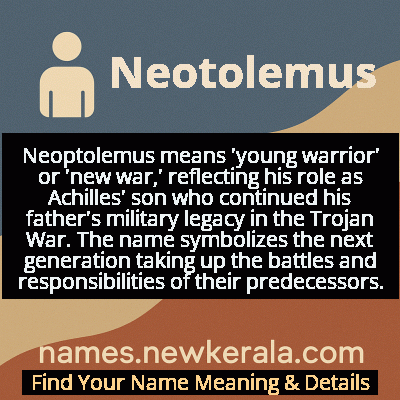Neotolemus Name Meaning & Details
Origin, Popularity, Numerology Analysis & Name Meaning of Neotolemus
Discover the origin, meaning, and cultural significance of the name NEOTOLEMUS. Delve into its historical roots and explore the lasting impact it has had on communities and traditions.
Name
Neotolemus
Gender
Male
Origin
Greek
Lucky Number
4
Meaning of the Name - Neotolemus
Neoptolemus means 'young warrior' or 'new war,' reflecting his role as Achilles' son who continued his father's military legacy in the Trojan War. The name symbolizes the next generation taking up the battles and responsibilities of their predecessors.
Neotolemus - Complete Numerology Analysis
Your Numerology Number
Based on Pythagorean Numerology System
Ruling Planet
Uranus (Rahu)
Positive Nature
Strong sense of order, loyal, practical, and disciplined.
Negative Traits
Stubborn, overly serious, rigid, and prone to feeling restricted.
Lucky Colours
Blue, gray.
Lucky Days
Saturday.
Lucky Stones
Blue sapphire.
Harmony Numbers
1, 7, 8.
Best Suited Professions
Managers, engineers, accountants, organizers.
What People Like About You
Dependability, discipline, practicality.
Famous People Named Neotolemus
Neoptolemus of Epirus
Ancient Greek King
Ruler of Epirus and founder of the Molossian dynasty, descendant of Achilles' son
Neoptolemus I of Epirus
Molossian King
Expanded Epirus' territory and established important political alliances
Neoptolemus II of Epirus
Greek Monarch
Ruled Epirus during the Hellenistic period, continuing the Aeacidae dynasty
Name Variations & International Equivalents
Click on blue names to explore their detailed meanings. Gray names with will be available soon.
Cultural & Historical Significance
In historical contexts, several kings of Epirus adopted the name Neoptolemus, claiming direct descent from Achilles through his son and using this mythological connection to legitimize their rule. The Molossian dynasty particularly emphasized this lineage, with Neoptolemus I and II ruling Epirus during the 4th and 3rd centuries BCE. This royal adoption demonstrates how mythological names served political purposes, connecting contemporary rulers to heroic ancestors and reinforcing their authority through perceived divine or heroic ancestry. The name thus bridges mythological narrative and historical reality in Greek cultural consciousness.
Extended Personality Analysis
Individuals named Neoptolemus are typically associated with a complex blend of warrior spirit and inherited destiny. They often exhibit intense determination, physical courage, and a strong sense of familial duty, driven by the weight of living up to legendary predecessors. The mythological Neoptolemus demonstrates both noble qualities in his military prowess and loyalty to his father's memory, yet also displays moments of extreme violence, such as his killing of King Priam at Troy's altars. This duality suggests a personality capable of great achievement but requiring strong moral guidance to channel aggressive tendencies constructively.
The name carries connotations of someone who must navigate the challenging space between honoring tradition and forging their own path. Like the mythological figure who had to step into his famous father's role while establishing his own identity, modern bearers might feel pressure to achieve greatness while wrestling with the expectations that come with such a storied name. The personality is often marked by a certain intensity and depth, combined with the potential for both heroic accomplishment and moral complexity. Those drawn to this name often value strength, legacy, and cultural heritage, seeing themselves as part of a larger historical or familial narrative.
Modern Usage & Popularity
In contemporary times, Neoptolemus remains an exceptionally rare given name, primarily used in academic circles, by classical enthusiasts, or within Greek families seeking to honor their mythological heritage. The name sees occasional revival in Greece itself, particularly among families with strong connections to classical education or those wishing to make a distinctive cultural statement. Its usage is virtually nonexistent in global naming statistics, placing it among the most uncommon classical names. Modern bearers typically encounter the name through literature, university classics departments, or historical reenactment communities rather than everyday life. The complexity and length of the name, combined with its strong mythological associations, make it a choice for parents seeking something profoundly meaningful rather than conventionally popular. It represents the extreme end of classical name revival, appealing to those with deep appreciation for Greek mythology and willingness to embrace a name that requires explanation and carries significant historical weight.
Symbolic & Spiritual Meanings
Neoptolemus symbolizes the continuation of legacy and the complex inheritance of both greatness and burden. As 'new war,' he represents the next generation taking up the struggles of their predecessors, embodying the idea that children must often complete their parents' unfinished battles. The name carries deep metaphorical significance about the transmission of identity across generations - the son who must both honor and escape the shadow of a famous father. It also symbolizes the duality of heroism and brutality that often accompanies military glory, serving as a reminder that victory can come at great moral cost. In psychological terms, Neoptolemus represents the archetype of the heir who must navigate the complicated territory between ancestral expectation and individual identity, between inherited destiny and personal choice. The name serves as a powerful symbol of how the past inevitably shapes the present, and how each generation must find its own way to carry forward both the blessings and burdens of its inheritance.

